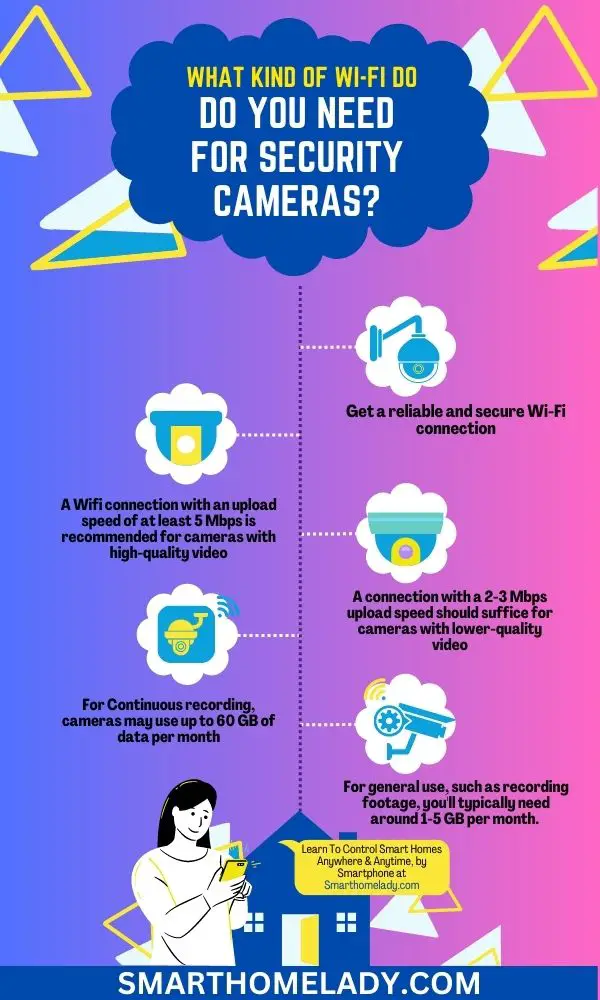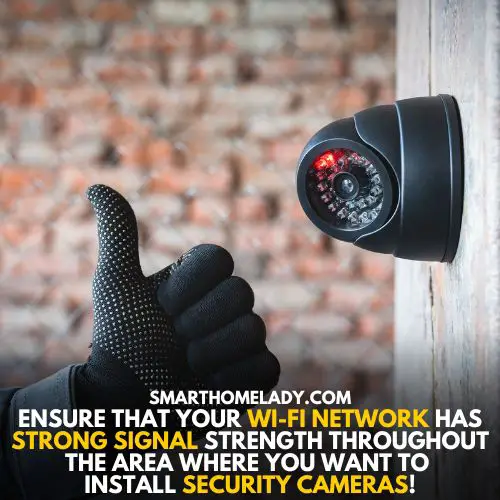Are you planning to install security cameras in your home or office? If yes, then you might be wondering what kind of WiFi I need for security cameras to work properly.
The answer is simple: you need a reliable and secure Wi-Fi connection that can handle the bandwidth requirements of your security cameras.
In this article, we’ll explore the different types of Wi-Fi connections available and help you choose the best one for your security camera needs. So, let’s dive in and find out what kind of Wi-Fi you need for security cameras.

Contents
- 1 What kind Of WiFi Do I Need For Security Cameras – Speed & Quality
- 2 Importance Of A Secure Wi-Fi Connection For Security Cameras
- 3 Factors To Consider When Choosing A Wi-Fi Network For Security Cameras
- 4 Do security cameras use a lot of Wi-Fi?
- 5 How much WiFi do I need for security cameras?
- 6 Do Wi-Fi cameras need a router?
- 7 Do You Need Wi-Fi Or Internet For Security Cameras?
- 8 Is 100 Mbps good for security cameras?
- 9 How Many GB Do I Need For CCTV?
- 10 How Many GB Do Security Cameras Use?
- 11 Conclusion
What kind Of WiFi Do I Need For Security Cameras – Speed & Quality
When it comes to security cameras, having a reliable and secure Wifi connection is essential. The type of WiFi you need for your security cameras will depend on the quality of video you want to upload and how frequently you want the footage to be uploaded.
For example, if you have high-quality cameras that record in 1080p or even 4K resolution, you will need a Wifi connection with a high upload speed to ensure that the footage is uploaded quickly and efficiently.
A Wifi connection with an upload speed of at least 5 Mbps is recommended for cameras with high-quality video.
On the other hand, if you have lower-quality cameras that record in 720p resolution or lower, you can get away with a Wifi connection with a lower upload speed.
A connection with a 2-3 Mbps upload speed should suffice for cameras with lower-quality video.
Additionally, it’s important to consider your number of cameras and how frequently you want the footage to be uploaded.
If you have multiple cameras and want the footage to be uploaded frequently, you will need a Wifi connection with a higher upload speed to handle the increased bandwidth.
Overall, when it comes to security cameras, having a reliable and secure Wifi connection with a sufficient upload speed is crucial to ensure that your footage is uploaded quickly and efficiently.
Suggested Readings
- Is It Illegal To Tamper With Security Cameras?
- Can We Use CCTV Camera Without DVR?
- Can I Use Xfinity Security Camera Without Service?
- Do Security Cameras Have To Be Visible?
Importance Of A Secure Wi-Fi Connection For Security Cameras
As an owner of a smart home, I cannot stress enough the importance of having a secure Wi-Fi connection for your security cameras.
This is because most security cameras rely on an internet connection to function properly and transmit data.
A weak or unsecured Wi-Fi connection can make it easy for hackers to gain access to your camera system and compromise its integrity.
How to Secure Wi-Fi Connection for Security Cameras?
There are many ways to secure Wi-Fi connections for security cameras. The following are three common ways.
1. Encryption
One way to ensure the security of your camera system’s Wi-Fi connection is by using encryption.
Encrypting your Wi-Fi means that any data transmitted between your cameras and other devices will be scrambled so that only authorized users with the correct key can decipher it.
Encryption makes it much harder for hackers to intercept sensitive information such as video footage or login credentials.

2. Remote Monitoring
Another important feature of a secure Wi-Fi connection is remote monitoring. With this capability, you can monitor your cameras from anywhere in the world via an app on your smartphone or tablet.
However, remote monitoring also opens up another potential vulnerability if not done securely.
3. Strong Passwords And 2-FA
That’s why it’s vital to have strong passwords and two-factor authentication enabled when accessing your camera system remotely.
By taking these precautions, you’ll greatly reduce the risk of unauthorized access to your surveillance footage and keep yourself and others safe.
Factors To Consider When Choosing A Wi-Fi Network For Security Cameras
Whether you are installing security cameras at your home or office, selecting the right Wi-Fi network is crucial to keep your premises safe and secure.
Here are some of the key factors that you should consider when choosing a Wi-Fi network for security cameras:
1. Network Security
One of the most important factors to consider when choosing a Wi-Fi network for security cameras is network security.
Your Wi-Fi network should be secure and encrypted to prevent unauthorized access to your surveillance system. WPA2 encryption is currently considered the most secure encryption protocol for Wi-Fi networks.
2. Signal Strength
Another important factor to consider is the signal strength of your Wi-Fi network. A weak signal can cause connectivity issues and result in poor video quality or dropped connections.
You need to ensure that your Wi-Fi network has strong signal strength throughout the area where you want to install security cameras.

3. Bandwidth
Bandwidth is another critical factor to consider when choosing a Wi-Fi network for security cameras. Surveillance cameras require a significant amount of bandwidth to transmit high-quality video footage.
Bandwidth allocation becomes crucial when multiple devices are connected to the same network. Prioritize traffic by giving higher priority levels to video streaming services while limiting other applications’ usage when necessary.
Ensure that your Wi-Fi network has enough bandwidth to support all of your security cameras without causing any lag or buffering issues.
4. Interference
Interference from other devices can cause connectivity issues and result in poor video quality or dropped connections. Your Wi-Fi network should be operating on a frequency that is not affected by interference from other devices such as microwaves, cordless phones or other Wi-Fi networks.
As more devices connect to the internet, they create congestion on the same frequency bands as your router.
To mitigate this issue, consider using dual-band routers that simultaneously operate on both 2.4GHz and 5GHz frequencies. Additionally, move any appliances or electronics away from the router that could potentially interfere with the signal.
Suggested Readings
- Can A CCTV Camera Work Without Red Light?
- How Long Does A CCTV Footage Last?
- Do You Need 4K TV For 4K Security Cameras?
- Do Wireless Security Cameras Need Internet?
5. Compatibility
Lastly, you need to ensure that your security cameras are compatible with your Wi-Fi network. Some cameras may only work with specific Wi-Fi networks or require specific network settings.
Therefore, ensure that your security cameras are compatible with your Wi-Fi network before you install them.
By considering these factors, you can select a Wi-Fi network that meets the specific needs of your security cameras and ensures that your premises remain safe and secure at all times.
Remember: Creating a dependable wireless infrastructure doesn’t happen overnight but requires consistency through proper equipment configuration and continuous monitoring – ultimately leading to securing one’s property through smart technology.
Frequently Asked Questions FAQs
Do security cameras use a lot of Wi-Fi?
Security cameras that use Wi-Fi can consume a lot of data, but the amount depends on several factors.
For Continuous recording, cameras may use up to 60 GB of data per month, and an upload speed of at least 5 Mbps is required to ensure smooth streaming.
However, not all cameras record continuously, and some have motion detection features that only activate when there’s movement.
It’s also important to note that the number of cameras, video quality, and length of recordings can all impact Wi-Fi usage.
So, while security cameras can use a lot of Wi-Fi, it’s possible to manage the usage with the right settings and configurations.
How much WiFi do I need for security cameras?
When it comes to security cameras, having a reliable and fast internet connection is crucial.
The amount of WiFi you need for security cameras depends on several factors, including the number of cameras you have and the resolution of the video they produce.
To ensure smooth video streaming and reliable connectivity, it’s recommended to have an upload speed of at least 5 Mbps per camera.
For example, if you have four cameras, you should have an upload speed of at least 20 Mbps.
However, it’s important to note that this is just a general guideline. If your cameras produce high-definition video or you want to access the footage remotely, you may need more bandwidth.
Do Wi-Fi cameras need a router?
The answer is yes; wifi cameras require a router to connect to the internet and transmit data. A router acts as a gateway between the camera and the internet, allowing the camera to send and receive data through the network.
For example, let’s say you have a wifi camera installed in your home and want to monitor it remotely using your smartphone.
Without a router, the camera wouldn’t have a way to connect to the internet, and you wouldn’t be able to access the live feed.
On the other hand, if you have a router in your home, the camera can connect to the network and transmit data to the internet. This allows you to access the live feed from anywhere in the world, as long as you have an internet connection.
Do You Need Wi-Fi Or Internet For Security Cameras?
When it comes to security cameras, the need for wifi or an internet connection depends on the type of camera you are using and your specific needs. Let’s take a look at some examples.
Wired security cameras typically do not require wifi or internet connection. These cameras are hardwired to a recording device or monitor and do not rely on any external network to function.
For instance, if you have a wired security camera installed at your front door, you can rest assured that it will work even if your wifi is down or there’s no internet connection.
On the other hand, wireless security cameras do require wifi or an internet connection to function. These cameras transmit live footage to your smartphone, tablet, or computer via wifi or the Internet.
A good example of this is the popular Nest Cam, which requires a wifi connection to be able to stream live video to your device.
There are also hybrid security cameras that can work with or without wifi. These cameras can be wired to a recording device or monitor but also have the option to connect to wifi for remote viewing.
An example of this is the Arlo Pro 2, which can be used as a standalone camera without wifi but also allows you to access live footage remotely if connected to wifi.
Is 100 Mbps good for security cameras?
100 Mbps can be good for security cameras depending on the number of cameras and the resolution of the footage.
If you have a small number of cameras and they are recording at a lower resolution, 100 Mbps should be more than enough to handle the data transfer.
However, if you have a large number of cameras or they are recording at a higher resolution, you may need a faster internet connection to ensure smooth and uninterrupted streaming.
How Many GB Do I Need For CCTV?
When it comes to CCTV, the amount of GB you need largely depends on the type of camera you’re using and how you plan to use it.
For general use, such as recording footage and storing it for later review, you’ll typically need around 1-5 GB per month. This is assuming you’re using a standard CCTV camera that records footage to a hard drive or DVR.
However, if you’re using an IP camera, the amount of GB you need can vary greatly depending on the quality of the camera and how much footage you plan to record.
For example, a 720p IP camera recording 24/7 at a standard quality level may require between 3-389 GB per month.
Meanwhile, a 1080p camera recording at a higher quality level may require upwards of 1 TB of storage space per month.
If you plan to watch live streams from your CCTV cameras, you’ll also need to consider the amount of data being transmitted. On average, a live stream from an IP camera will use around 0.98 GB per hour.
How Many GB Do Security Cameras Use?
Generally, a typical security camera can use anywhere from 1GB to 5GB of storage per hour of footage, depending on the abovementioned factors.
So, if you have four cameras running 24/7, you could be looking at upwards of 120GB per day.
Conclusion
In conclusion, having a secure and reliable WiFi connection is crucial for your security cameras to function effectively. Using a WiFi network that supports WPA2 encryption, has a strong password, and a separate guest network is recommended.
Additionally, consider investing in a WiFi extender or mesh system to ensure your cameras have a strong signal throughout your property.
Don’t compromise the security of your home or business by using a weak WiFi connection. Take action now and upgrade to a secure and reliable WiFi network to keep your property safe and secure.


